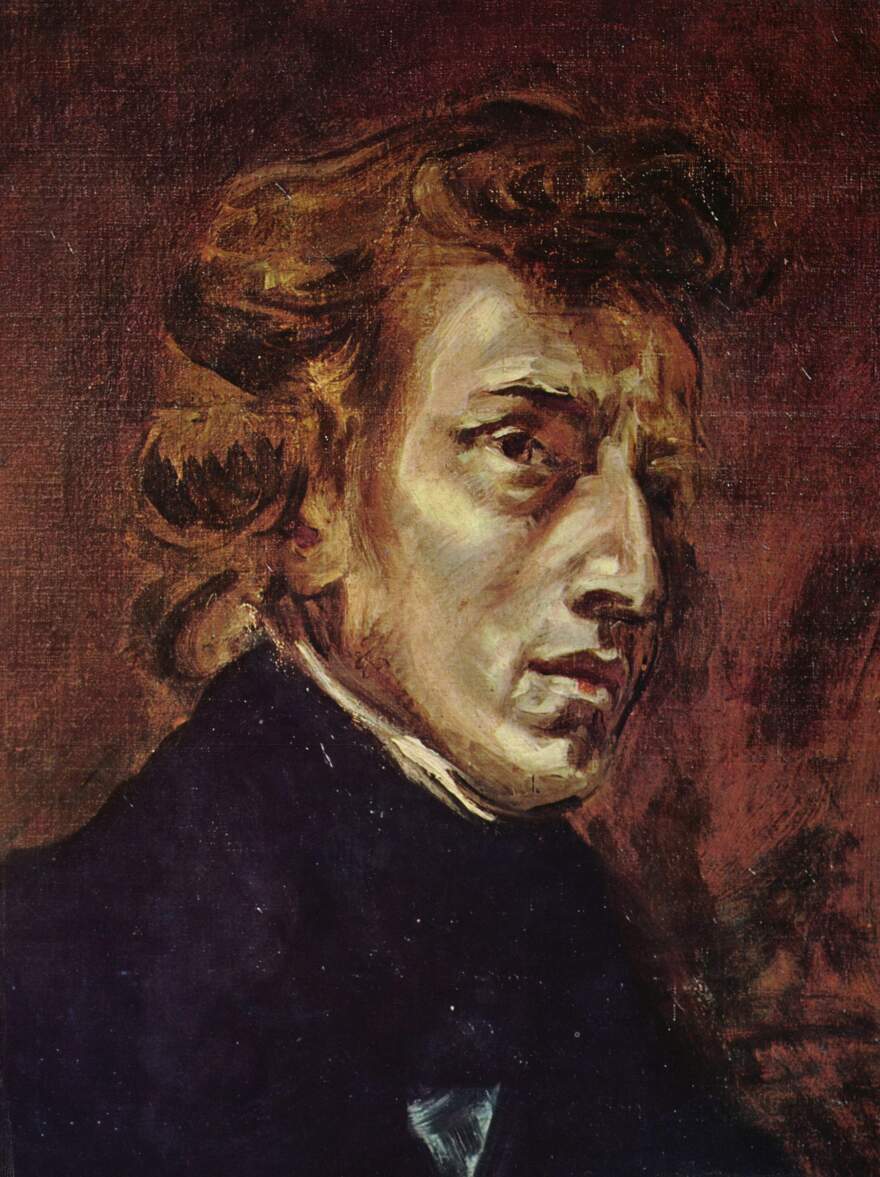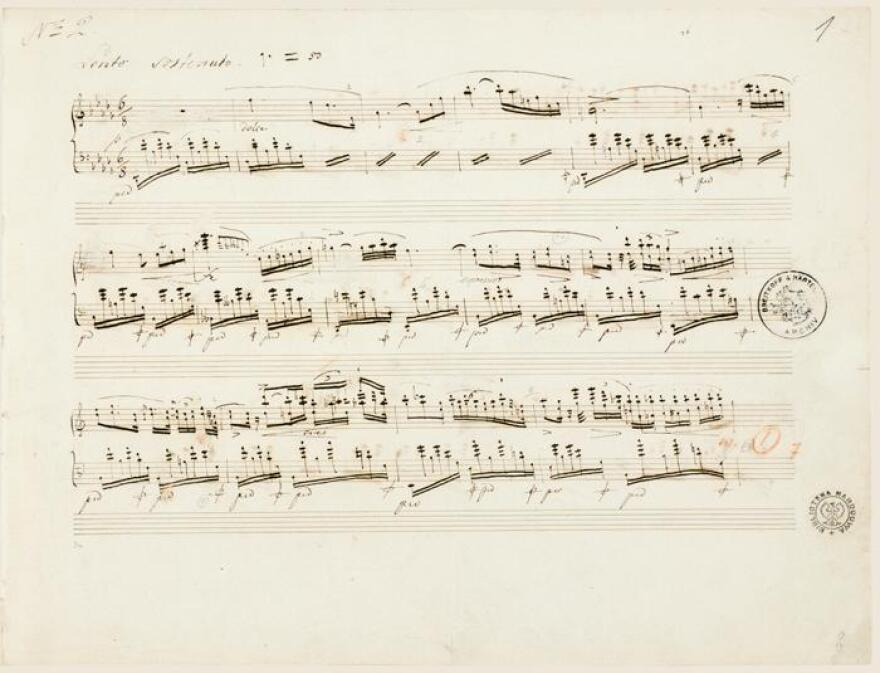In this Sonatas & Soundscapes interview that aired Friday, October 10th, South Carolina Public Radio's Bradley Fuller speaks with Dr. Tom Hicks about his recent album Chopin: The Complete Nocturnes, available now through Divine Art Records. The Guernsey-born pianist is Director of Piano Studies at the College of Charleston, and Artistic Director of the CofC's International Piano Series.
TRANSCRIPT:
FULLER: Tom, wonderful to have you.
HICKS: Thank you very much for having me.
FULLER: Your previous recording projects have featured piano works by a range of past and contemporary composers, including some who aren't household names on the level of Frédéric Chopin. So what led you to change course a bit here and devote an album entirely to this music that is so well known, so frequently performed, and so frequently recorded?
HICKS: A couple of things come to mind. I mean, first of all, the idea behind this recording came from a live concert program that I was playing. That was what I called Music at Night and it was nocturnes by Chopin at the center. And Chopin was always at the center in the way that I thought about this music.
But then, I was also playing nocturnes by Debussy who, although very familiar, his Nocturne is not so often played. Scriabin, Clara Schumann, Fanny Hensel, and Moonlight Sonata—which I like to say was there less for the “moonlight,” which of course came afterwards, and more for the fantasy that I was associating with dreams and music of the night in that way.

And so, coming out of that with a few Chopin nocturnes in my hands—that was where the idea for recording all of them came from. And the opportunity came along at the right time as well. But originally, that goes back even further to the pandemic when I was fortunate enough to be in Guernsey, which had a unique kind of pandemic experience. We still had one or two lockdowns, and during those lockdowns I was really exploring very widely the nocturne genre.
Again, Chopin at the center but looking at all sorts of different approaches to the nocturne. And that was at a time where I was lucky enough to be actually recording the Liszt Sonata, which was, I guess, my first step into kind of mainstream repertoire. Obviously very, very intense and alongside that the John Island Sonata which is a wartime work. And I think it just felt natural in the kind of introspective, slower pace of life that the lockdown was inviting that I was looking at these introspective, calmer—generally calmer—pieces, although of course in Chopin’s hand they're really quite wide-ranging.
FULLER: You've clearly spent some time researching and studying the history of these pieces and the way they've been performed. Is there something that many audiences and listeners—and performers, perhaps—have been missing here lately with regard to how these should be performed? Or is there even a “should” to this?
HICKS: Yeah, I really think there isn't a “should.” There are many ways to go about it. There are many ways not to go about it, too. And so I believe that we should take everything that we do know about the performance history and about what Chopin intended with these pieces, but also recognize that there's an awful lot that we don't know, and we'll never know.
What became clear to me was just how freely Chopin thought about these pieces—how much improvisation formed a fundamental part of how he conceived them.
And in that respect, I very much believe in what Richard Taruskin (a musicologist who worked a lot on this question of authenticity) said and that is: if we're going to be authentic, then we have to kind of fill in the gaps. And there is only one way of doing that, and that's with performers’ intuition. And so interpretation has to form part of a cohesive whole—of a whole interpretation. If you present only what you know, then it's first of all going to be the same every time, which is not very interesting. And, second of all, can only ever be incomplete.
So I’ve put down how I feel about these nocturnes, informed by what we do know, but the next recording should be very different.
FULLER: What do we know about Chopin and the way he would have performed these, or perhaps passed on to students? Is it a bit different, perhaps, than we've imagined?
HICKS: I think so. I think many of the ways that we talk about authenticity, fidelity to the score, fidelity to the composer’s intentions—actually, most of this is informed by 20th century ways of thinking. Stravinsky, Boulez talked about what they hoped for from the performer, and essentially it was very little [laughter] as they took more and more control over their scores and the idea of the musical work being represented by that written version—those two things coming closer together.
But when we retrospectively apply that to the 19th century—especially to a composer like Chopin—it starts to really fall apart, or at the very least be a contradiction.
So, what became clear to me was just how freely Chopin thought about these pieces—how much improvisation formed a fundamental part of how he conceived them and then continued to work with them as he wrote things down. And he struggled to write things down because he kind of conceived of it in his head, and notation isn't a perfect way of translating that onto paper.

But throughout that process, or because of that process, he then was changing the piece all the time and continued to do that when he corrected proofs for publishers. He sent three different versions to three different publishers. Very often, they were different. And so we have all these multiple, authentic, original versions before you even get to his handwriting in the scores of his pupils, which add further variants and authentic, Chopin-original ideas for these pieces. And some of those have been forgotten over the history of editing, but they're still there and they're still Chopin and so I did enjoy exploring some of those.
FULLER: Well, you’ve recorded all 21 nocturnes, 18 of which were published in Chopin's lifetime and three of which were published posthumously. Are there any you can point to in particular that might really strike, you know, the average classical music listener as being more of a departure from what they've heard before? Or perhaps any passages—these variants you've mentioned—that maybe someone could hear and say “Oh, that's not how I've heard it done before”?
HICKS: “That's a little different.” Yeah, the best example is probably going to be Op. 9, No. 2—that very famous, beautiful E-flat Nocturne. The reason being just that there are so many variants of that piece, it so happens. And so lots to choose from. You can almost take a sort of collage approach to building your own E-flat major Nocturne from all these options that exist. That's sort of what I did.
So it's not only different, but I suppose this version—just talking about the notes on the page—is, I believe, entirely unique. Never been recorded before. Because parts of it have been. You can go to pupils of pupils of Chopin and hear some of these variants. But not exactly this this lineup of one variant after another. And that was informed because some of them are really quite complex.
One of my favorite pianists (and especially recording artists), Koczalski, records this nocturne with absolutely wild improvisations that were supposedly written into his score by Mikuli, who studied directly with Chopin. But really very virtuosic—leggierissimo double thirds up and down the piano. And personally—and this is where intuition and interpretation come in—they’re kind of too complex for me, for what feels like a very simple, singing piece. So I was attracted to some of these available variants over those and therefore chose to perform them.
FULLER: Beyond questions of interpretation, when it came to simply making this recording, I understand that you really made these nocturnes nocturnal?
HICKS: Right, and I must admit that was largely practical. We recorded it at night because that's when this hall was at its quietest. Fairly soundproof, but not entirely soundproof. And then the stage lights went on and they were really, really noisy stage lights. So they had to go off, and that meant that we had to light the set, if you like, with lamps. And, I mean, it created exactly the right atmosphere. But I can't say I went into the recording session with that intention or to do it for that reason, but it was a sort of happy consequence
FULLER: I’ve got a very unfair question for you next: if you had to pick a nocturne out of these 21 as your “desert island” nocturne, or Channel Islands nocturne, Mallorca palling-around-with-the-ghost-of-Chopin—whichever island you’re on—but you had to just pick one, which do you think would be the Tom Hicks Nocturne? Your signature? Your favorite?
HICKS: That is very difficult. I love the later B major nocturne [Op. 62, No. 1]—the one with the trills. It does kind of take the genre I think to new heights. And it's just exquisite.
FULLER: What has the response been, if any, from critics or audiences? Have you heard any reviews so far?
HICKS: Yeah, reviews have been really promising. And I must admit I was nervous about putting out something so popular, so well known, so mainstream, because I felt that it would be so easy for a critic to say “Who does this guy think he is, when there are so many great pianists already on record playing these pieces?” And that hasn't happened yet. In fact, the reception has been very, very warm from those that are most interested in Chopin and those that don't talk about Chopin very often.
I think the aspect of interpretation and some of these variants has kind of captured some attention as well. So yeah, so far so good. And then a couple of awards as well and really very, very flattering reviews from Europe and from the UK and from the US as well.
FULLER: Well Tom, thanks so much for sharing about your work, these phenomenal insights into, really, these treasures of the solo piano repertoire, and for this wonderful music that we can listen to. I really appreciate your time today.
HICKS: Thank you very much for having me.
More information about Hicks can be found on his website.
More information about the College of Charleston International Piano Series can be found at go.charleston.edu/pianoconcert.
The College of Charleston is a financial supporter of South Carolina Public Radio.




